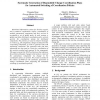Free Online Productivity Tools
i2Speak
i2Symbol
i2OCR
iTex2Img
iWeb2Print
iWeb2Shot
i2Type
iPdf2Split
iPdf2Merge
i2Bopomofo
i2Arabic
i2Style
i2Image
i2PDF
iLatex2Rtf
Sci2ools
KBSE
2000
IEEE
2000
IEEE
Systematic Generation of Dependable Change Coordination Plans for Automated Switching of Coordination Policies
Distributed information systems for decision support and e-commerce applications require coordination of multiple autonomous components and their services to accomplish a set of global goals. In such systems, a global and often distributed coordination policy actively governs the coordination among the distributed components. The policies are used to interpret messages or events (e.g., job assignments, changes in data) from the cooperating components, in order to generate tasks with sequencing constraints. The generated tasks and their sequencing are then used as a basis for coordination of the services provided and required by the components. This paper presents the SWAP architecture that addresses the problem of dynamic changes in the needs or context of the autonomous components via change in the coordination policy at run-time. We present a method in the context of SWAP for the systematic generation of change coordination plans supporting the automated switching of coordination po...
Applications Require Coordination | Autonomous Components | Coordination Policy | KBSE 2000 | Software Engineering |
| Added | 31 Jul 2010 |
| Updated | 31 Jul 2010 |
| Type | Conference |
| Year | 2000 |
| Where | KBSE |
| Authors | Prasanta K. Bose, Mark G. Matthews |
Comments (0)

